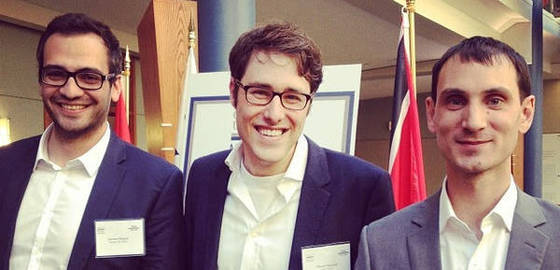Five HEC Paris professors present at the SFS Finance Cavalcade Conference
Five HEC Professors were among 250 renowned scholars from all over the world, at one of the most prestigious academic conferences in Finance. The 2014 Cavalcade Finance conference was hosted by McDonough School of Business, Washington, D.C. from May 16-21, 2014. Increasingly selective this year, the Cavalcade received 653 paper submissions, of which only 11.5% were accepted, including papers presented by Thierry Foucault, Johan Hombert, Daniel Schmidt, David Thesmar and Ioanid Rosu.

The conference, hosted on the beautiful campus of Georgetown University, nurtured considerable discussion and provided insights into topical issues including asset pricing strategies, market microstructure, hedge funds, and corporate governance.
To begin, Johan Hombert was the first finance professor to take to the floor and present his paper on News Trading and Speed , co-written with Thierry Foucault and Ioanid Rosu.
In this research paper, they explain why speed matters in news trading. Johan showed that an investor's optimal trading strategy is significantly different when he observes news faster than other competitors, versus when he does not, holding the precision of his signals constant. When the investor has fast access to news, his trades are much more sensitive to news, they account for a much bigger fraction of trading volume, and they forecast short run price changes. Moreover, in this case, an increase in news informativeness increases liquidity, volume, and the fast investor's share of trading volume. Lastly, price changes correlate more with news and trades, and contribute more to volatility, than when the investor has fast access to news.
Then, Jérôme Dugast from the Banque de France and a recent Ph.D graduate from HEC Paris presented his work on False News, Informational Efficiency, and Price Reversals, co-written with Thierry Foucault. They explained that speculators can discover whether a signal is true or false by processing it, but this takes time. Hence they face a trade-off between trading fast on a signal (i.e., before processing it), at the risk of trading on a false positive, or trading after processing the signal, at the risk that prices already reflect their information. The number of speculators who choose to trade fast increases with news reliability and decreases with the cost of fast trading technologies.
Finally, Daniel Schmidt, the youngest researcher of the HEC Paris delegation, presented his thesis paper on Stock Market Rumors and Credibility to an international audience for the first time.
He demonstrates that stock prices occasionally move in response to unverified rumors. Daniel proposes a model in which a capital-constrained investor spreads rumors because she wants to influence other investors. He shows that the incentives to tell the truth depend on the interplay between the rumormonger's investment horizon and the information acquisition decisions of the message-receiving investors. Analyzing a dataset on stock rumors covered in U.S. newspapers, he finds tentative evidence for these predictions. Rumors appear more frequently for firms held by short-term investors, and rumors for these firms lead to more trading and volatility, consistent with the idea that these rumors are more credible. His results point to an overlooked benefit of short investment horizons: They encourage information sharing between investors.
At the same time, in another breakout room, Johan Hombert presented a completely different paper, entitled Can Unemployment Insurance Spur Entrepreneurial Activity? . This paper, co-written by Antoinette Schoar (MIT), David Sraer (Princeton University) and David Thesmar, (HEC Paris) investigates how a large-scale French reform to reduce the risk of small business creation for unemployed workers, affects the composition of people who are drawn into entrepreneurship. Johan explained that the 2002 French reform facilitated business creation by the unemployed, provoking an increase in 25% of firm creation. New firms started in response to the reform are, on average, smaller, but have similar growth expectations and education levels when compared to start-ups before the reform. They are also just as likely to survive or to hire. To conclude, Johan emphasized the fact that after this reform, unemployed people returned to work more quickly, and that better jobs were created